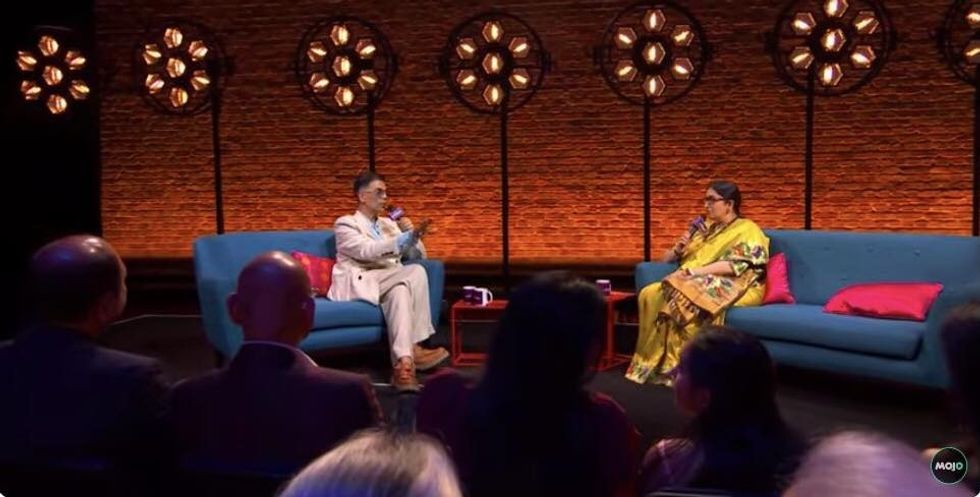by LAUREN CODLING
DISCLOSING ethnic pay gaps in businesses will be a “real catalyst for change”, an Asian peer who led a review into workplace equality last year has said.
Baroness Ruby McGregor-Smith CBE made the comments on Tuesday (16) as it was revealed that employers could be forced to publish their race pay gap under plans set out by prime minister Theresa May last Thursday (11).
May launched the consultation on ethnicity pay reporting with the aim of inviting thousands of businesses to disclose wage differences between BAME employees and their white counterparts.
The announcement was made a year after the Race Disparity Audit was published, which revealed how individuals from a minority background were treated in society.
Announcing the launch, the prime minister highlighted that ethnic minority employees felt they were “hitting a brick wall” in terms of career progression.
“Our focus is now on making sure the UK’s organisations, boardrooms and senior management teams are truly reflective of the workplaces they manage. The measures we are taking today will help employers identify the actions needed to create a fairer and
more diverse workforce,” May said.
The government also unveiled the Race at Work Charter which aims to encourage a step-change in recruitment and support diversity in the workplace.
Last week, May attended a roundtable discussion with business leaders whose companies were inaugural signatories of the charter in central London.
Last February, Baroness McGregor-Smith published an independent report on race in
the workplace. The review found greater workplace diversity could boost Britain’s economy by £24 billion a year.
In key recommendations, the Conservative peer urged companies with more than 50 employers to publish a breakdown of their workforce by race and pay band, and suggested drawing up five year aspirational diversity targets.
She told Eastern Eye she was pleased with the government’s actions to improve equality in the workplace and described it as a “positive step forward”.
“I think it will be a real catalyst for change in some organisations,” Baroness McGregor-Smith revealed.
In round tables the former Mitie chief conducted on the issue, Baroness McGregor-Smith claimed organisations within both public and private sectors were keen to report on pay gaps as it would allow them to work on what interventions needed to occur.
“They said: ‘If we go down the reporting route, we will know where we stand, and we will then be able to talk about the different things we can do,” she said, adding she hoped organisations would begin to volunteer their information, as many have not.
According to the Equality and Human Rights Commission (EHRC), only three per cent of
employers measure their ethnicity and disability pay gaps.
“There have been small signs that voluntary [disclosure] would work, but I don’t think it is coming quickly enough,” the peer said. “As always, with a review like mine, you would want to see that pace change quickly, so the quicker the better as far as I’m concerned.”
Simon Woolley heads Downing St’s Race Disparity Unit Advisory committee. He agreed with Baroness McGregor-Smith and hoped the government’s move would make a difference in the long run.
Disclosing data would allow real action to be taken, he told Eastern Eye, as he believed companies would be “shamed by the monstrous gaps” in pay.
“This is a starting point, it’s a good one, [and] it might begin to move the equality dial,” Woolley said. He added the advisory committee tried to play a significant role in directing the government on the latest actions to address workplace diversity.
“Using that data, in many ways, will name and shame those companies who are doing so badly that you can focus on it,” Woolley, who is also the director and one of the founders of Operation Black Vote, said.
“When you have greater opportunities and equality, business is more productive,” he added.
On how young minority individuals should pursue equality in the workplace, Baroness
McGregor-Smith said people should look for an employer who is actively working on providing equal opportunities.
The former CEO claimed she was successful as she was supported throughout her career.
“We will need to do some more in terms of sponsorship, mentoring and supporting young women and minorities to help them make the right career choices,” she said.
Woolley urged young minorities to “stand up and be counted”, when addressing equality in the workplace. He advised individuals to campaign in a wider group rather than alone, in a respectful manner.
“Unless we challenge the status quo and hold people to account, then too often we are the cleaners and the security guards and not the CEO,” he said.
“Yes, we can clean and guard, but we can also be in the boardroom making a big difference.”
Last year, the government introduced gender pay gap regulations demanding large businesses publish the contrasts between what they pay their male and female staff in salaries. Over 10,000 reported their data.
David Isaac, chair of the Equality and Human Rights Commission (EHRC), said extending mandatory reporting beyond gender would raise transparency about other inequalities in the workplace.
“[EHRC] have previously called for mandatory reporting on ethnicity in recruitment, retention and progression for employers with over 250 employees, and welcome the prime minister’s commitment to consulting on this,” he said.
“This is a positive step towards creating truly inclusive workplaces that allow everyone to achieve their full potential.”
Dawn Butler, the shadow minister for women and equalities, highlighted the Labour party’s
call for race pay gap reporting in their 2017 manifesto. She added “anything less than mandatory pay gap reporting alongside action plans” would render the consultation
as a PR stunt.
Woolley added he hoped the latest move by government could tackle “uncomfortable truths” within the workplace and beyond.
“If we get it right, everyone wins,” he said. “If we get it wrong, we too often have divided communities and divided societies, and that is no good for anyone.”
















 Karan Johar and Smriti Irani
Karan Johar and Smriti Irani
